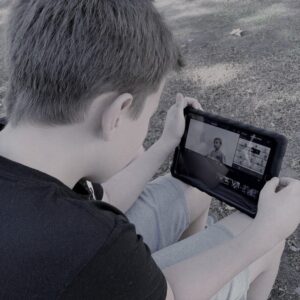Film School for Global Scientists
Project Directors: Jessica Summers, Jill Castek and Lia Falco (all University of Arizona)
In partnership with the College of Education at the University of Arizona.
 For learners in the contemporary digital age, media literacy is a central aspect of language and cultural competence. This involves both an understanding of how media messages are constructed and an awareness of how individuals with different cultural and linguistic backgrounds may interpret media messages differently (ACTFL, 2011, p. 13). A key way to develop both levels of media literacy is by engaging learners as makers, so that they are not just consumers and viewers, but also curators and creators of media texts (Lotherington & Jenson, 2011). This project couples the multimodally rich form of film with the globally relevant topic of water stewardship, as a means of supporting language learners as they develop the ability to communicate through their new languages creatively, flexibly, fluidly, and reflectively.
For learners in the contemporary digital age, media literacy is a central aspect of language and cultural competence. This involves both an understanding of how media messages are constructed and an awareness of how individuals with different cultural and linguistic backgrounds may interpret media messages differently (ACTFL, 2011, p. 13). A key way to develop both levels of media literacy is by engaging learners as makers, so that they are not just consumers and viewers, but also curators and creators of media texts (Lotherington & Jenson, 2011). This project couples the multimodally rich form of film with the globally relevant topic of water stewardship, as a means of supporting language learners as they develop the ability to communicate through their new languages creatively, flexibly, fluidly, and reflectively.
The Film School for Global Scientists project develops, implements, and refines a project-based learning unit for a middle school dual language science class that combine the SSI of water stewardship with media-making. A “best practices” implementation guide will be produced to assist other educators in replicating the program, and the project was showcased in a professional development series focusing upon integration of STEM-related activities into FL education.
➣ Access the full project details at the portal here.
A webinar was presented on December 8th, 2021 by Veronica Oguilve, Jill Castek, Jessica Summers, and Lia Falco; the recording is here.
In today’s world, it is important for learners to have opportunities for self-expression and meaning-making through multimodal creation processes. From remixing to documenting everyday events, filmmaking encourages participatory meaning making and promotes meaningful language use within and beyond the classroom. This webinar follows the implementation of Film School for Global Scientists, a CERCLL project that links filmmaking and second language learning to water conservation and environmental stewardship. This webinar presents filmmaking as a strategy that encourages students to use their linguistic resources, scientific knowledge, and digital literacies to design films that speak to the wider community. In this interactive session, presenters shared ways that a school-wide collaboration invited connections between language learning, Language Arts, and STEM. Participants: 1) learned filmmaking techniques that encourage second language learning; 2) explored ways that mentor texts can be used to scaffold the language learning process, and 3) discussed strategies for implementing filmmaking in their own second language teaching context. Illustrative examples feature student perspectives and a showcase of students’ short films. Presenters offered guidance about translation apps, genre considerations, and the pairing of visual and linguistic resources to convey a second language purposefully.
During the webinar, participants worked on these collaborative documents:
Download the webinar presentation slides here.

